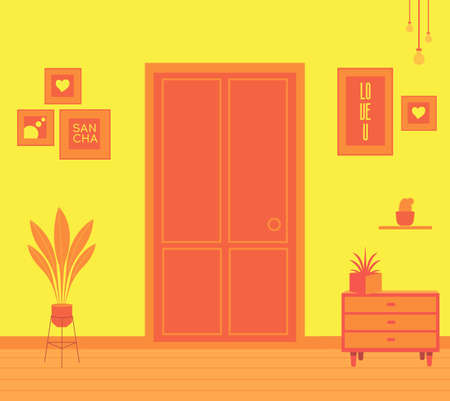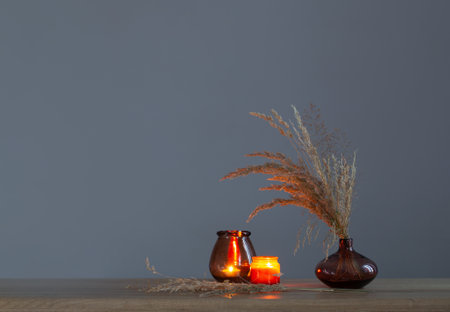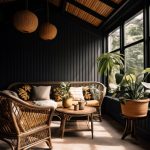Origins of Bohemian and Eclectic Design
Bohemian and eclectic interior design styles have deep roots in history, shaped by the influences of nomadic cultures, free-spirited artists, and unconventional ways of living. These styles embrace diversity, creativity, and personal expression, making them a favorite for those who love unique and meaningful spaces.
The Influence of Nomadic Cultures
The origins of Bohemian design can be traced back to nomadic groups, particularly the Romani people who traveled across Europe. Their lifestyles were reflected in their homes—filled with vibrant textiles, handcrafted furniture, and an appreciation for mixing different cultural elements. The idea of layering colors, patterns, and materials comes from these early travelers who collected decor from various places they visited.
Artistic Expression in Interior Design
During the 19th century, artists and writers in France adopted the Bohemian style as a form of rebellion against traditional interior aesthetics. They filled their homes with second-hand furniture, exotic rugs, and walls adorned with art that told personal stories. This artistic influence remains a key aspect of Bohemian interiors today.
Eclecticism: A Celebration of Diversity
While Bohemian design focuses on free-spirited creativity, eclectic interiors take it a step further by intentionally blending different design periods and cultural influences. Eclectic design emerged as people traveled more and brought back decor from different regions. It represents an intentional mix-and-match approach where antique pieces coexist with modern elements.
Key Characteristics of Bohemian vs. Eclectic Design
| Feature | Bohemian Design | Eclectic Design |
|---|---|---|
| Main Influence | Nomadic cultures, artists | Diverse historical and cultural elements |
| Color Palette | Rich, warm tones with layered textures | A balance between bold contrasts and harmonious blends |
| Main Elements | Vintage textiles, handmade decor, plants | A mix of furniture styles from different eras |
| Aesthetic Approach | Carefree, unstructured arrangement | Intentional combination of various styles |
The Evolution Begins
The early influences of Bohemian and eclectic design set the foundation for what would become two beloved interior styles. As these styles evolved over time, they continued to embrace individuality and self-expression while adapting to changing trends and cultural shifts.
2. Key Characteristics and Elements
Bohemian and eclectic interior design styles are known for their free-spirited, artistic, and unique approach to decorating. They emphasize personal expression and creativity, resulting in spaces that feel curated rather than designed. Below are some of the defining characteristics that make these styles stand out.
Layered Textures
One of the key elements of Bohemian and eclectic interiors is the use of layered textures. This creates depth and warmth in a space, making it feel inviting and comfortable. Common textures include:
- Woven fabrics like macramé and rattan
- Plush rugs with intricate patterns
- Velvet or linen upholstery
- Distressed wood or metal accents
Vibrant Colors
Color plays a major role in these design styles. While Bohemian spaces often feature earthy tones mixed with jewel colors, eclectic interiors can incorporate any combination of bold hues. Some common color choices include:
| Bohemian Style | Eclectic Style |
|---|---|
| Earthy browns, deep reds, mustard yellow | Bold blues, bright pinks, striking greens |
| Moss green, burnt orange, ochre | A mix of muted neutrals with statement colors |
Mixed Patterns
The fearless combination of patterns is a signature aspect of these styles. Whether it’s floral prints with geometric shapes or tribal designs paired with stripes, mixing patterns adds visual interest and energy to a space.
Vintage Furnishings
A love for vintage furniture is another defining characteristic. Antique pieces, thrift store finds, and repurposed furnishings all contribute to the charm of Bohemian and eclectic interiors. These pieces add character and a sense of history to the space.
A Collected-Over-Time Aesthetic
Unlike traditional interior styles that follow a strict theme, Bohemian and eclectic designs embrace an “assembled over time” look. Spaces often include:
- A mix of old and new items
- Treasured souvenirs from travels
- Diverse cultural influences in decor
- An emphasis on personal storytelling through objects
This approach makes every home unique, reflecting the personality and experiences of the people who live there.

3. The Influence of Global Cultures
Bohemian and eclectic interior design have been deeply influenced by various global cultures. These styles thrive on diversity, combining elements from different parts of the world to create a unique, layered aesthetic. Three of the most significant cultural influences come from Moroccan, Indian, and Eastern European traditions.
Moroccan Influence
Moroccan design is known for its rich colors, intricate patterns, and luxurious textures. This influence is evident in Bohemian and eclectic interiors through the use of:
- Vibrant textiles: Handwoven rugs, embroidered cushions, and colorful throws.
- Ornate metalwork: Lanterns, trays, and decorative mirrors with detailed engravings.
- Moorish architecture: Arched doorways, carved wood furniture, and zellige tile patterns.
Indian Influence
The Indian aesthetic brings warmth and spirituality into Bohemian and eclectic spaces. Some key elements include:
- Handcrafted furniture: Intricately carved wooden pieces with traditional motifs.
- Batik and block-printed fabrics: Used in curtains, bedding, and upholstery.
- Sacred symbols: Mandalas, lotus flowers, and elephant figurines for decor.
Eastern European Influence
The folk art and craftsmanship of Eastern Europe contribute to the eclectic charm of these interiors. Common features are:
- Floral embroidery: Found on cushions, tablecloths, and wall hangings.
- Ceramic pottery: Hand-painted plates and bowls with vibrant patterns.
- Kilims and woven textiles: Used as rugs or draped over furniture for a cozy feel.
Cultural Influences in Bohemian & Eclectic Design
| Cultural Influence | Main Characteristics |
|---|---|
| Moroccan | Vibrant colors, ornate metalwork, mosaic tiles |
| Indian | Batik fabrics, carved wood furniture, spiritual symbols |
| E. European | Floral embroidery, ceramic pottery, woven kilims |
The blending of these diverse cultural elements helps create an inviting space filled with history and personality. By incorporating Moroccan patterns, Indian textiles, and Eastern European folk art, Bohemian and eclectic interiors celebrate global craftsmanship while maintaining a free-spirited aesthetic.
4. Evolution in the Modern Era
Bohemian and eclectic interior design have continued to evolve, blending traditional elements with contemporary influences. While maintaining their free-spirited essence, these styles have adapted to modern trends, creating spaces that feel both artistic and functional.
Blending Old and New
One of the most distinctive aspects of modern Bohemian and eclectic design is the seamless mix of vintage and contemporary elements. Homeowners now incorporate antique furniture alongside sleek, minimalist pieces, creating a balanced yet dynamic aesthetic.
Key Features of Modern Bohemian and Eclectic Design
| Traditional Elements | Modern Adaptations |
|---|---|
| Rich, layered textiles | Sustainable and organic fabrics |
| Handmade, artisan decor | Locally sourced or upcycled materials |
| Diverse cultural influences | Global-inspired patterns with a minimalist touch |
| Maximalist approach | More curated and intentional layering |
Embracing Sustainability
With the rise of eco-conscious living, modern Bohemian and eclectic interiors often incorporate sustainable materials. Reclaimed wood, second-hand furniture, and natural fibers are popular choices, allowing homeowners to create unique spaces while reducing their environmental impact.
Personalization and Expression
Today’s Bohemian and eclectic interiors continue to celebrate individuality. Rather than following rigid design rules, people curate their spaces with meaningful decor, travel souvenirs, handmade artwork, and family heirlooms. This approach ensures that each home tells a personal story.
The Role of Technology in Design
The digital age has also influenced the evolution of these styles. Social media platforms like Pinterest and Instagram provide endless inspiration, making it easier for individuals to discover new ideas and incorporate them into their homes. Additionally, advancements in smart home technology allow for a seamless blend of aesthetics and functionality.
The Future of Bohemian and Eclectic Interiors
As design trends continue to shift, Bohemian and eclectic interiors will likely keep evolving while staying true to their core values—creativity, individuality, and artistic freedom. Whether through bold color choices or carefully curated collections, these styles remain a testament to self-expression in modern living spaces.
5. Practical Tips for Achieving the Look
Bringing Bohemian and Eclectic design into your home is all about creativity, personality, and a sense of adventure. This style allows you to mix colors, textures, and patterns while maintaining a harmonious feel. Here are some practical guidelines to help you achieve the perfect balance.
Incorporating Bohemian and Eclectic Elements
The key to achieving this look is layering different design elements in an intentional way. Consider these aspects:
| Element | Description |
|---|---|
| Color Palette | Bohemian interiors often feature warm, earthy tones with vibrant accents, while eclectic spaces can mix bold and muted colors. |
| Textures & Fabrics | Use a combination of materials such as woven rugs, velvet cushions, macramé wall hangings, and wooden furniture. |
| Furniture & Layout | A mix of vintage and modern furniture works well. Opt for unique pieces that tell a story rather than matching sets. |
| Decor & Accessories | Add global-inspired decor such as Moroccan lanterns, tribal prints, handcrafted ceramics, and layered textiles. |
| Plants & Greenery | Lush indoor plants like monstera, ferns, or hanging ivy enhance the organic feel of the space. |
Balancing Boldness with Harmony
Avoid overwhelming the space by keeping a few design principles in mind:
- Create a Focal Point: Choose one standout piece—such as an oversized artwork or an intricately patterned rug—to anchor the room.
- Edit Thoughtfully: While eclectic design embraces diversity, be selective to prevent clutter and maintain visual flow.
- Cohesive Color Accents: Use a unifying color scheme to tie different elements together without making the space feel chaotic.
- Mix Old & New: Combining antique finds with contemporary designs keeps the space dynamic yet balanced.
Personalizing Your Space
Your home should reflect your personality and experiences. Here’s how to make it uniquely yours:
- Add Personal Collections: Showcase travel souvenirs, vintage books, or handmade crafts that hold sentimental value.
- Create Cozy Corners: Layer soft furnishings like throw blankets and floor cushions to make your space inviting.
- Dare to DIY: Customize furniture with paint or upholstery changes to add character.
- Tell a Story: Every item should have meaning—whether its a thrifted find or a family heirloom.
The beauty of Bohemian and Eclectic interior design is its freedom of expression. By thoughtfully mixing styles, colors, and textures, you can create a space that feels both adventurous and harmonious.


